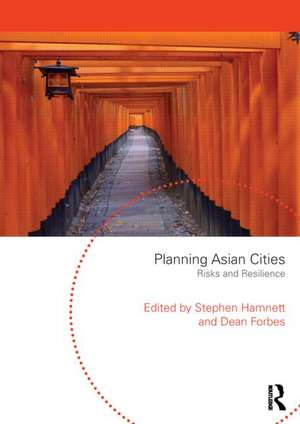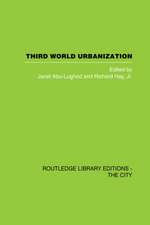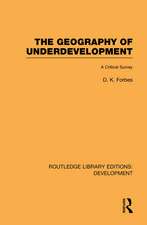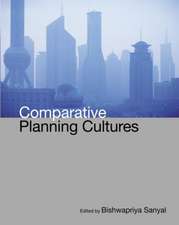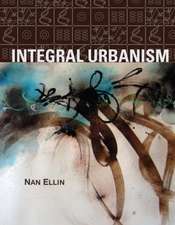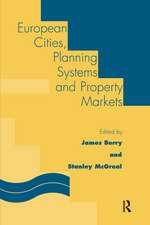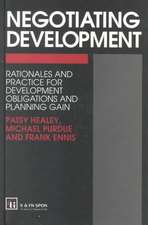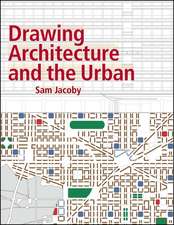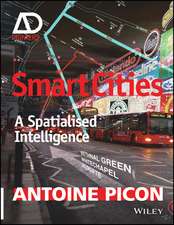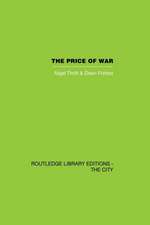Planning Asian Cities: Risks and Resilience: Planning, History and Environment Series
Editat de Stephen Hamnett, Dean Forbesen Limba Engleză Paperback – 22 mar 2013
They show how globalization, and the competition to achieve global city status, has had a profound effect on all these cities. Tokyo is an archetypal world city. Singapore, Hong Kong and Seoul have acquired world city characteristics. Taipei and Kuala Lumpur have been at the centre of expanding economies in which nationalism and global aspirations have been intertwined and expressed in the built environment. Beijing, Hong Kong and Shanghai have played key, sometimes competing, roles in China’s rapid economic growth. Bangkok’s amenity economy is currently threatened by political instability, while Jakarta and Manila are the core city-regions of less developed countries with sluggish economies and significant unrealized potential.
But how resilient are these cities to the risks that they face? How can they manage continuing pressures for development and growth while reducing their vulnerability to a range of potential crises? How well prepared are they for climate change? How can they build social capital, so important to a city’s recovery from shocks and disasters? What forms of governance and planning are appropriate for the vast mega-regions that are emerging? And, given the tradition of top-down, centralized, state-directed planning which drove the economic growth of many of these cities in the last century, what prospects are there of them becoming more inclusive and sensitive to the diverse needs of their populations and to the importance of culture, heritage and local places in creating liveable cities?
Din seria Planning, History and Environment Series
-
 Preț: 306.97 lei
Preț: 306.97 lei -
 Preț: 311.61 lei
Preț: 311.61 lei -
 Preț: 351.55 lei
Preț: 351.55 lei -
 Preț: 332.68 lei
Preț: 332.68 lei -
 Preț: 394.62 lei
Preț: 394.62 lei - 9%
 Preț: 1245.81 lei
Preț: 1245.81 lei - 8%
 Preț: 386.09 lei
Preț: 386.09 lei - 23%
 Preț: 373.92 lei
Preț: 373.92 lei - 26%
 Preț: 766.31 lei
Preț: 766.31 lei - 12%
 Preț: 345.17 lei
Preț: 345.17 lei - 23%
 Preț: 327.26 lei
Preț: 327.26 lei -
 Preț: 424.58 lei
Preț: 424.58 lei - 16%
 Preț: 244.47 lei
Preț: 244.47 lei - 15%
 Preț: 463.82 lei
Preț: 463.82 lei - 18%
 Preț: 949.75 lei
Preț: 949.75 lei - 26%
 Preț: 1017.20 lei
Preț: 1017.20 lei -
 Preț: 416.96 lei
Preț: 416.96 lei - 12%
 Preț: 299.87 lei
Preț: 299.87 lei -
 Preț: 366.46 lei
Preț: 366.46 lei - 18%
 Preț: 1274.88 lei
Preț: 1274.88 lei -
 Preț: 471.33 lei
Preț: 471.33 lei - 12%
 Preț: 302.80 lei
Preț: 302.80 lei -
 Preț: 410.77 lei
Preț: 410.77 lei -
 Preț: 396.33 lei
Preț: 396.33 lei - 18%
 Preț: 1274.11 lei
Preț: 1274.11 lei -
 Preț: 422.04 lei
Preț: 422.04 lei - 17%
 Preț: 245.56 lei
Preț: 245.56 lei - 26%
 Preț: 1018.82 lei
Preț: 1018.82 lei - 15%
 Preț: 461.87 lei
Preț: 461.87 lei - 28%
 Preț: 824.70 lei
Preț: 824.70 lei - 18%
 Preț: 1007.12 lei
Preț: 1007.12 lei -
 Preț: 373.21 lei
Preț: 373.21 lei - 25%
 Preț: 768.30 lei
Preț: 768.30 lei - 26%
 Preț: 990.63 lei
Preț: 990.63 lei - 31%
 Preț: 767.47 lei
Preț: 767.47 lei - 28%
 Preț: 991.70 lei
Preț: 991.70 lei
Preț: 316.34 lei
Preț vechi: 358.60 lei
-12% Nou
Puncte Express: 475
Preț estimativ în valută:
60.53€ • 63.20$ • 50.10£
60.53€ • 63.20$ • 50.10£
Carte tipărită la comandă
Livrare economică 04-18 aprilie
Preluare comenzi: 021 569.72.76
Specificații
ISBN-13: 9780415832205
ISBN-10: 0415832209
Pagini: 344
Ilustrații: 116 b/w images and 15 tables
Dimensiuni: 174 x 246 x 20 mm
Greutate: 0.64 kg
Ediția:1
Editura: Taylor & Francis
Colecția Routledge
Seria Planning, History and Environment Series
Locul publicării:Oxford, United Kingdom
ISBN-10: 0415832209
Pagini: 344
Ilustrații: 116 b/w images and 15 tables
Dimensiuni: 174 x 246 x 20 mm
Greutate: 0.64 kg
Ediția:1
Editura: Taylor & Francis
Colecția Routledge
Seria Planning, History and Environment Series
Locul publicării:Oxford, United Kingdom
Public țintă
PostgraduateCuprins
1. Risks, Resilience and Planning in Asian Cities Stephen Hamnett and Dean Forbes 2. Uneven Geographies of Vulnerability: Tokyo in the Twenty-First Century André Sorensen 3. The Dragon’s Head: Spatial Development of Shanghai Susan Walcott 4. Beijing: Socialist Chinese Capital and New World City Gu Chaolin and Ian G. Cook 5. Taipei’s Metropolitan Development: Dynamics of Cross-Strait Political Economy, Globalization and National Identity Liling Huang and Reginald Yin-Wang Kwok 6. Seoul as a World City: The Challenge of Balanced Development Seong-Kyu Ha 7. Hong Kong: The Turning of the Dragon Head Anthony Yeh 8. Singapore: Planning for More with Less Belinda Yuen 9. Going Global: Development, Risks and Responses in Kuala Lumpur and Putrajaya Sirat Morshidi and Asyirah Abdul Rahim 10. Governing the Jakarta City-Region: History, Challenges, Risks and Strategies Wilmar Salim and Tommy Firman 11. Bangkok: New Risks, Old Resilience Douglas Webster and Chuthatip Maneepong 12. Manila: Metropolitan Vulnerability, Local Resilience Brian Roberts
Recenzii
“…a remarkable collection of papers on East and South East Asian cities.” – Environment and Planning B
"... provides very readable and up-to-date introductory overviews of planning strategies in 11 individual cities in Pacific Asia. For those interested in these cities — and especially in their histories, world city strategies, and emerging risks — this book is warmly recommended." - Bart Wissink, International Planning Studies
"... I would strongly recommend this book for courses on Asia-Pacific geography and urbanisation, as well as urban planning." - David W. Edgington, Urban Policy and Research
"... provides very readable and up-to-date introductory overviews of planning strategies in 11 individual cities in Pacific Asia. For those interested in these cities — and especially in their histories, world city strategies, and emerging risks — this book is warmly recommended." - Bart Wissink, International Planning Studies
"... I would strongly recommend this book for courses on Asia-Pacific geography and urbanisation, as well as urban planning." - David W. Edgington, Urban Policy and Research
Descriere
Stephen Hamnett and Dean Forbes have brought together some of the region’s most distinguished urbanists to explore the planning history and recent development of Pacific Asia’s major cities. They show how globalization, and the competition to achieve global city status, has had a profound effect on all these cities.
But how resilient are these cities to the risks that they face? How can they manage continuing pressures for development and growth while reducing their vulnerability to a range of potential crises? And, given the tradition of top-down, centralized, state-directed planning which drove the economic growth of many of these cities in the last century, what prospects are there of them becoming more inclusive and sensitive to the diverse needs of their populations and to the importance of culture, heritage and local places in creating liveable cities?
But how resilient are these cities to the risks that they face? How can they manage continuing pressures for development and growth while reducing their vulnerability to a range of potential crises? And, given the tradition of top-down, centralized, state-directed planning which drove the economic growth of many of these cities in the last century, what prospects are there of them becoming more inclusive and sensitive to the diverse needs of their populations and to the importance of culture, heritage and local places in creating liveable cities?
